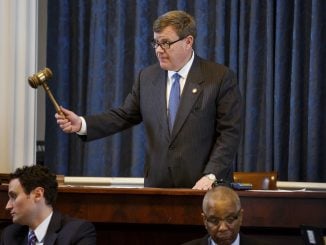RALEIGH — North Carolina Democratic Gov. Roy Cooper signed House Bill 103, the 2022 Appropriations bill on July 11.
An ABC omnibus bill was among 19 bills signed by Cooper on July 8. The day before, he signed 11 other bills. Those of note recently include Senate Bill 762, the NC Farm Act of 2022; Senate Bill 435, Terminations of States of Emergency; and Senate Bill 671, which makes various changes to virtual education options.
Of the seven bills outstanding bills requiring action, Cooper signed two, vetoed four and let one become law without his signature. The four new vetoes bring Cooper’s total to 75, well beyond the 35 issued by all of his predecessors combined.
“Today, I signed the state budget (HB 103) that includes critical investments in education, economic development, transportation and the state workforce,” Cooper said in a press statement Monday. “This budget does not include Medicaid expansion, but the leadership in both the House and Senate now support it and both chambers have passed it.”
Cooper also said, “Negotiations are occurring now and we are closer than ever to agreement on Medicaid expansion, therefore a veto of this budget would be counterproductive.”
In a joint statement, House Speaker Tim Moore (R-Kings Mountain) and Senate Leader Phil Berger (R-Eden) addressed Cooper’s remarks on Medicaid expansion.
“The General Assembly passed the 2022 budget with strong bipartisan support, and we are pleased Gov. Cooper signed this responsible spending plan into law,” the lawmakers said. “Moving forward, we are committed to working together to improve healthcare access and expand Medicaid, while providing the necessary safeguards to preserve the state’s fiscal strength. Active negotiations are occurring now toward that end.”
Cooper’s office also announced that changes requested by the N.C. Department of Health and Human Services to ensure flexibility to respond to the pandemic means that he will lift the state of emergency on August 15.
The bills vetoed included House Bill 49, Concealed Carry Permit Lapse/Revise Law; Senate Bill 101, Require Cooperation with ICE 2.0; Senate Bill 593, Schools for the Deaf and Blind; and House Bill 823, Child Advocacy Centers/Share Information.
“Requiring sheriffs to waive firearm safety and training courses for those who let their concealed weapons permit lapse is yet another way Republicans are working to chip away at commonsense gun safety measures that exist in North Carolina,” Cooper said of his veto of House Bill 49.
On the bill requiring cooperation with ICE, Cooper said in his veto message that “This law is only about scoring political points and using fear to divide North Carolinians.”
“With the stroke of his pen, Gov. Cooper just gave sanctuary sheriffs permission to shield an illegal immigrant who rapes or murders a North Carolinian,” said state Sen. Chuck Edwards (R-Henderson) in a statement on Cooper’s veto of the ICE cooperation bill. “Keeping violent criminals off our streets should be a shared priority, but this veto proves that Gov. Cooper isn’t interested in increasing public safety if it goes against his liberal donors’ wishes.”
The governor’s veto message of Senate Bill 593 also claimed the measure was “blatantly unconstitutional” and “continues this legislature’s push to give more control of education to Boards of Trustees made up of partisan political appointees.”
House Bill 911, Regulatory Reform Act of 2022, became law without Cooper’s signature.
“This bill contains necessary changes in several areas but will become law without my signature due to a provision involving confessions of judgement that could be unfair to consumers,” Cooper said of House Bill 911. “Weakening their due process rights in this way could also conflict with federal regulations that recognize confessions of judgement are harmful to consumers. Legislators have pledged to eliminate this provision and I expect them to be true to their word.”




